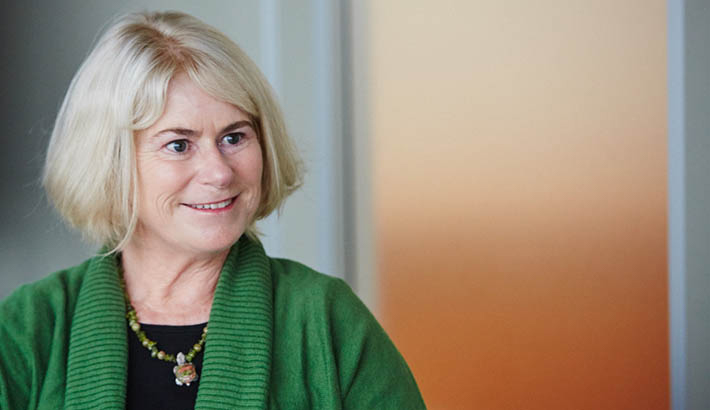
ACEMS 2019 Public lecture series

Professor Dianne Cook
The 2019 ACEMS Public Lecture Series showcased a wide range of topics, the first of which gave an insight into personal data management with world-renowned econometrician and ACEMS Associate Investigator Professor Dianne Cook. Di discussed how accessing data can help you to understand the world you live in – how mobile phones continuously broadcast our location details; how our household smart meter reports our electronic footprint in 30-minute chunks; and how using your credit card can generate an ad appearing in your Facebook stream. Di then described how it is possible to access both your own data, and the data of your environment. Armed with an ability to create statistical ‘plots’ of your data, you can make better sense of the world around you.
The ACEMS Public Lecture Series engages with the broader community and is designed to inspire, challenge and educate the general public via a diverse range of topics that include the latest research and findings on cutting-edge subjects in mathematics and statistics.
A total of nine public lectures were delivered in six of the Centre’s nodes. The speakers were a mix of ACEMS members, visiting professors, alumni, early-career researchers, students and associates, who shared their knowledge and expertise with engaged audiences, often concluding in dynamic Q-&-A sessions. The series also includes a pre-lecture reception providing a wonderful opportunity for the public to network with the mathematical sciences community.

NSW Chief Scientist and Engineer Professor Hugh Durrant-Whyte’s public lecture.

Professor Hugh Durrant-Whyte (C) with ACEMS Chief Investigators Scott Sisson (L) and Robert Kohn (R).
The 2020 series will continue to present a diverse program of interesting and accessible lectures from leading researchers for the community and general public to ponder, understand and enjoy.
The Lectures
| Date | Node | Speaker | Title and Abstract |
|---|---|---|---|
|
13 Feb 2019 |
Monash |
Professor Dianne Cook, Professor of Business Analytics at Monash, Fellow of the American Statistical Association and ACEMS Associate Investigator |
How Visualisation and Open Data Can Empower You |
|
19 Mar 2019 |
UoA |
Dennis Liu, ACEMS PhD Student, and |
What do probability, disease and energy have in common? |
|
14 May 2019 |
UQ |
Professor Dirk Kroese, ACEMS Chief Investigator at UQ |
Random Stuff Have you ever wondered how random numbers and experiments can be produced by a very non-random device such as a computer? Are you sometimes bemused by "financial experts" explaining fluctuations in share prices? Would you like to know how we can use randomness to better search for a needle in a hay stack? |
|
11 Jun 2019 |
UTS |
Dr Suzanne Poynton (Acting Director and Research Manager) and |
Data science helping to create a better justice system In a recent project, for example, recidivism rates were compared for offenders who received an intensive correction order versus those given short prison sentences. With careful modelling to properly account for the nature of the crime, the analysis can be used to evaluate the effectiveness of intensive correction orders in reducing recidivism rates. |
|
16 Sep 2019 |
Monash |
Professor Bob Griffiths, Emeritus Professor at Oxford University, Adjunct Professor at Monash University, and Fellow of the Royal Society of London |
The Mathematics of Evolution within Species |
|
16 Sep 2019 |
QUT |
Dr Gentry White, QUT Senior Lecturer and ACEMS Associate Investigator |
Using data to discover new insights into terrorism The Global Terrorism Database is an open-source publicly available database based on a published methodology containing over 180,000 records of terrorist events from 1970-2017. Using this data, we can explore issues around terrorism and discover new insights into the fundamental questions surrounding terrorism. |
|
23 Oct 2019 |
UNSW |
Professor Hugh Durrant-Whyte, New South Wales Chief Scientist and Engineer. Hugh is an honorary fellow of the Institute of Engineers Australia (HonFIEAus), a fellow of the IEEE (FIEEE), of the Australian Academy of Science (FAA), of the Royal Academy of Engineering (FREng) and of the Royal Society of London (FRS). |
Zen and the Art of Bayesian Geology Bayesian methods explicitly estimate probability distributions on geological models and capture the ambiguity and uncertainty inherent in geological modelling. Bayesian methods also provide a natural way of combining very diverse measurement types with typical prior expert data. Together, these methods can offer a coherent and insightful approach to framing and addressing the mineral exploitation problem. |
|
21 Nov 2019 |
QUT |
Dr Susanna Cramb, QUT Institute of Health and Biomedical Innovation and ACEMS Associate Investigator |
Cancer and you: understanding the Australian Cancer Atlas This talk highlights the key findings from the Australian Cancer Atlas, gives insights to the methods and data used, and answers the question: "what do the results mean for you?" |
|
21 Nov 2019 |
UTS |
Dr Eugene Dubossarsky, Director and Principal Trainer at Presciient, and founder of ‘Data Science Sydney’ |
The Sydney Data Science Industry |